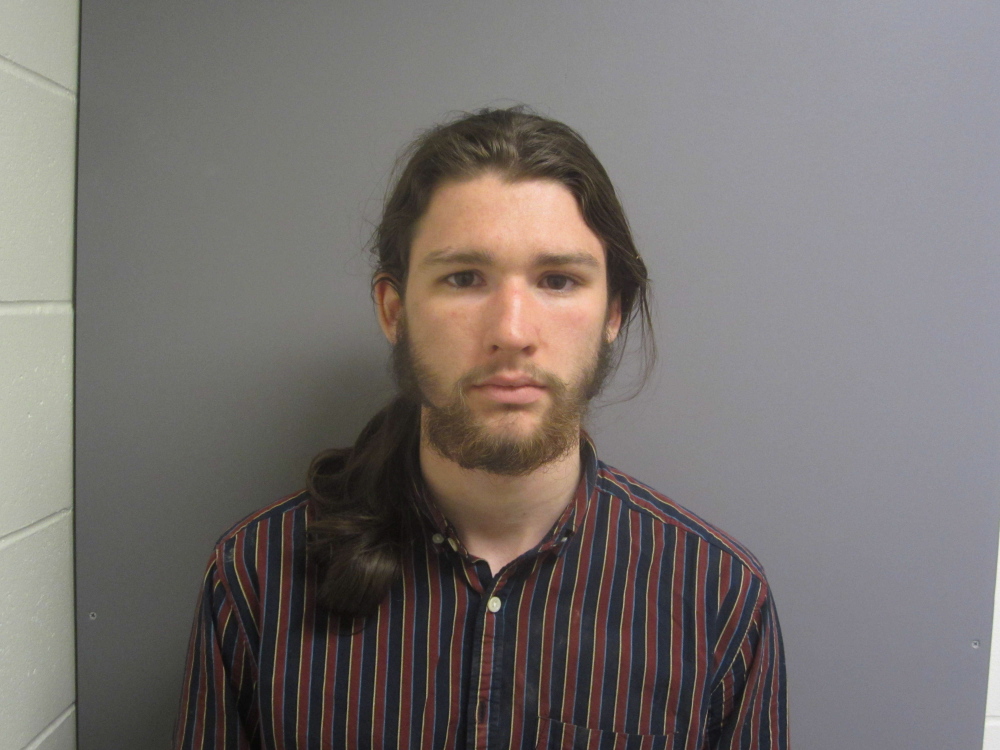BRUNSWICK — A Bowdoin College student was arrested over the weekend on a felony charge of gross sexual assault after being accused of raping a female student on campus, Brunswick police said.
Logan Taylor, 21, was arrested in Topsham around 5 a.m. Sunday, hours after the alleged offense occurred, and was turned over by Topsham police to Brunswick police, Sgt. Paul Hansen said Monday.
Taylor, whose listed address is in Brunswick, was arrested after talking to detectives at the Brunswick police station and was brought to the Cumberland County Jail in Portland, Hansen said.
Taylor was still in jail late Monday, held in lieu of $1,000 cash bail.
A Bowdoin College spokesman, Doug Cook, declined to say Monday whether Taylor would be suspended or give any other information about him.
“We are assisting the police in their investigation, and focusing on the safety and well-being of our students and other members of the college community,” Cook said in an email.
Brunswick police were first called by Bowdoin College security at 2:34 a.m. Sunday to the area of the Androscoggin Swinging Bridge, a footbridge that crosses the river from Brunswick into Topsham. Bowdoin security asked police to talk to a 20-year-old female student there, Hansen said.
“We were contacted by Bowdoin security when they went to pick up a student who had called for a ride,” the Brunswick police sergeant said. “She had some concerns about a friend of hers (Taylor) who she had been with earlier in the night.”
After police talked to the woman further, she told them Taylor had raped her that night on campus. She was taken to Mid Coast Hospital in Brunswick, Hansen said.
Brunswick police, with help from police dogs from Freeport and Topsham, searched for Taylor for hours. Topsham police found him around 5 a.m. in the area of Granite Hill Road in Topsham, Hansen said.
Hansen said he expected Brunswick police would have more information to release to the public Tuesday.
If Taylor is convicted of gross sexual assault, a Class A felony, he faces up to 30 years in prison.
The Bowdoin campus was mostly closed Monday evening, with only a few students remaining in dormitories after Saturday’s graduation ceremony and before the start of summer campus jobs June 1.
One student, Madeleine Livingston, 20, said she worked with Taylor at a theater club for two years but did not become close with him.
“He was an odd kid, but I didn’t know him very well,” Livingston said.
Another student, Frankie Ahrens, 19, said he didn’t know Taylor, but early Sunday when Ahrens was returning to his dorm, he was stopped by campus security officers.
“They stopped me and said, ‘You don’t happen to be Logan?'” Ahrens said. The security officers did not tell him why they were pursuing Taylor.
AN ISSUE OF NATIONAL CONCERN
Taylor’s arrest comes at a time of increased focus on sexual assaults on college campuses nationwide.
In May 2014, the U.S. Department of Education published a list of 55 colleges and universities with pending federal investigations into sexual violence. No Maine school was listed.
The same year, President Obama formed a task force that made recommendations to increase student safety, prompting many colleges to create a position of victim advocate and institute robust prevention efforts and confidential counseling services.
These steps are, however, only the latest in a nearly 30-year campaign by advocates to institute greater safety measures and public transparency around campus sex assault.
Since 1987, colleges and universities that participate in federal financial aid programs have been required to collect and publish statistics cataloging on-campus crime. Known as the Clery Act, the law was named for Jeanne Clery, a 19-year-old who was raped and murdered in her dorm room at Lehigh University in Lehigh, Pennsylvania in 1986. Her assailant, another Lehigh student not known to Clery, is now serving a life sentence without the possibility of parole, according to the Clery Center for Security on Campus.
The law has been amended four times since it was enacted, expanding protections for victims of sexual violence, and bolstering reporting requirements, according to the center.
The U.S. Department of Education now tracks crime statistics from every major educational institution and makes them available on its website.
At Bowdoin, where there are about 1,800 students, the college reported six forcible sex offenses on campus in 2013, the most recent year for which data are available. The college had four such reported offenses in 2012, seven in 2011 and seven in 2010.
The state’s two other premier private colleges, Bates College in Lewiston and Colby College in Waterville, have about the same student population with similar rates of reported cases.
Bates had eight reported forcible sex offenses on campus in 2013, eight in 2012 and six in 2011. Colby reported eight in 2013, two in 2012 and one in 2011, according to the U.S. Department of Education.
The number of reported forcible sex offenses at the state’s largest secondary schools fluctuated in recent years. At the flagship University of Maine campus in Orono, with an enrollment of about 11,200, there were 19 reports in 2013, five in 2012 and six in 2011. At the University of Southern Maine’s Gorham campus, there were four reports in 2013, 15 in 2012 and 10 in 2011.
Bowdoin has a detailed internal investigative process to respond to allegations of sexual assault by students. The process is not public and is conducted by college-appointed investigators, separate from criminal investigations by police, although the college’s process is not dependent on criminal charges being sustained.
If college officials determine that enough evidence exists to support a claim, the alleged perpetrator can be academically disciplined or expelled.
Comments are not available on this story.
Send questions/comments to the editors.



